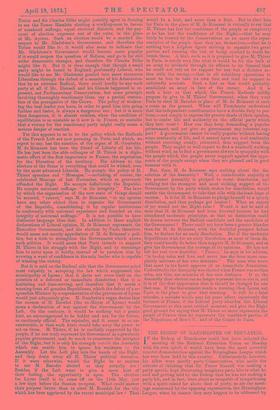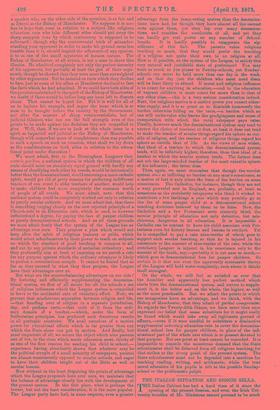THE BISHOP OF MANCHESTER ON EDUCATION.
f F the Bishop of Manchester could but have infected the meeting of the National Education Union on Monday with his own spirit, it would have been the most powerful counter-demonstration against the Birmingham League which has ever been held in this country. Unfortunately, however, his allies were mostly party-Conservatives, who made the mistake of thinking that Dr. Fraser himself was making a party speech, kept discovering imaginary party hits in what he said and getting told by the Bishop that he was not making a party hit, and in fact, were about as incapable of sympathising with a spirit raised far above that of party, as are the meet- ings summoned by the opposing organisation, the Birmingham League, when by chance they may happen to be addressed by
a speaker who, on the other side of the question, is as fair and as liberal as the Bishop of Manchester. We suppose it is use- less to hope that, even in relation to a subject like religious education, men who take different sides should put away the sharp snappish tone by which controversy is supposed to be enlivened ; though why the controversial trick of misunder- standing your opponent in order to make his ground seem less tenable than it is, should inspirit the adherents of any opinion, is to us one of the small mysteries of human nature. The Bishop of Manchester, at all events, is not a man to share this illusion. He admitted completely not only the perfect sincerity of his opponents, but partially at least the gist of their argu- ments, though he showed that they were more than outweighted by other arguments. But he insisted on facts which they decline to face, just as some of his allies at Manchester declined to face the facts which he had admitted. If we could have both sides of the question maintained in the spirit of the Bishop of Manchester, we doubt if there would be before long any issue left to dispute about. That cannot be hoped for. But it is well for all of us to imitate his example, and argue the issue which is so soon to be brought before the country by the Government, not after the manner of sharp controversialists, but of judicial thinkers who can see the full strength even of the points to be made against the decisions they are compelled to give. Well, then, if we are to look at the whole issue in a spirit as impartial and judicial as the Bishop of Manchester, though with somewhat more of completeness than was possible in such a Tech on such an occasion, what shall we lay down as the considerations on both sides in relation to the educa- tional point under discussion ? We must admit, first, to the Birmingham Leaguers that, cceteris paribus, a national system in which the children of all sects should meet on absolutely equal ground with hardly any means of classifying each other by creeds, would be intrinsically better than the denominational, would encourage a more catholic spirit, would get rid of petty reasons for preferring indifferent teachers of one creed to abler teachers of another, would help to make children feel more completely the common worth of people of all creeds. We must admit, next, that this national system could be completely worked out only in relation to purely secular subjects. And we must admit last, that there is something verging closely on the now rejected principle of a Church-rate in an Education rate, which is used, in however infinitesimal a degree, for paying the fees of pauper children at purely denominational schools. And on all these grounds we must admit freely that the system of the League has an advantage over ours. They propose a plan which would not keep alive the spirit of religious jealousy or pride, which would select schoolmasters by their power to teach on subjects On which the standard of good teaching is common to all, and not by any private standards of sectarian orthodoxy ; and they professedly aim at least at imposing on no parish a rate for any purpose against which the ordinary ratepayer is likely to profess a conscientious scruple. It cannot be denied that so far as they succeed in what they thus propose, the League have their advantages over us.
But what are the counterbalancing advantages on our side? By fostering and efficiently supplementing the denomina- tional system, we first of all secure for all the schools a use of religious influences which the League system is compelled to leave to the accidental care of voluntary effort. Next, we prevent that mischievous separation between religion and life, —that handing over of religion to a separate jurisdiction, day, and perhaps caste,—that exile of it from the ordi- nary domain of a teacher,—which, under the form of Sabbatarian principles, has produced such disastrous results in all puritanic countries. We avail ourselves of a motive power for educational efforts which is far greater than any which the State alone can put in motion. And finally, but most important of all, we secure the object which nine parents out of ten, in the class which needs education most, thinks of as One of the first reasons for sending his child to school,— experience having abundantly shown that whatever may be the political scruple of a small minority of ratepayers, parents are almost unanimously opposed to secular schools, and eager to have their children taught out of the Bible as well as secular lessons.
Now without in the least disguising the points of advantage which the League proposals have over ours, we maintain that the balance of advantage clearly lies with the development of the present system. In the first place, what is perhaps the lowest, but not the least consideration, it is the more popular. The League party have had, in some respects, even a greater advantage from the lump-voting system than the denomina- tions have had, for though they have almost all the earnest sects against them, yet they lap over many denomina- tions, and combine the secularists of all, and yet they can hardly get real power on any number of School- boards. It is hardly poseible to exaggerate the sig- nificance of this fact. The parents value religious
teaching so much, that they would prefer the teaching of a religion not quite their own to no religion at all. How is it possible, on the system of the League, to satisfy this very natural and justifiable state of preference? Yoa may trust as much as you please to Sunday-schools, yet Sunday- schools can never be held more than one day in the week, and on that day just the children who most need them will be least likely to attend. If moral and religious influence is to count for anything in education,—and in the education of vagrant children it must count for more than in that of any other class,—this is a very serious consideration indeed. Next, the religious motive is a motive power you cannot other- wise supply, and it is so great as to diminish immensely the burden otherwise falling on the rates,—ea burden which no one will undervalue who knows the grudginguess and sense of exasperation with which the rural ratepayer pays rates. Finally, however much the denominational system may tend to narrow the choice of teachers at first, at least it does not tend to make the teacher of secular things regard his sphere as out- side of religion, and the teacher of religious things regard his sphere as outside that of life. As the views of men widen, that ideal of a teacher to which the denominational system tends, will be infinitely higher, therefore, than that ideal of a teacher to which the secular system tends. The former does not rob the large-minded teacher of the most valuable sphere of his influence ; the latter does.
Then, again, we must remember that though the secular system aims at inflicting no burden on any man's conscience, as a matter of fact it only alters the form of the burden on some consciences. The Catholics, for instance, though they are not a very powerful sect in England, are, probably, at least as numerous as the crotchetty ratepayers who think it wicked to contribute a few farthings a year which may possibly go as the fee of some pauper child at a denominational school teaching doctrines believed by them to be false. Now, the Catholics and a few Protestant sects sincerely think the secular principle of education not only defective, but mis- chievous, dangerous to all education. It is impossible a Catholic can be content to have his child associate with Pro- testants even for history lessons and lessons in conduct. Yet he is compelled to pay a rate nine-tenths of which goes to support such secular teaching, so that he is injured in his conscience to the amount of nine-teethe of the rate, while the crotchetty Leaguer is injured in his conscience only to the amount of the tenth, say,—probably it is not near so mach,— which goes in denominational fees for pauper children. So certain is it that not even the apparently systematic theory of the League will hold water completely, even where it thinks itself strongest.
On the whole, we still feel as satisfied as ever that the humbler and apparently lees perfect method which starts from the denominational system and strives to supple- ment it, is the better and, on the whole, the higher, as well as the more practicable. But we admit the points in which our antagonists have an advantage, and we think, with the Bishop of Manchester, that they admit of partial compromise. As regards the Twenty-fifth Clause, we have more than once expressed our belief that some substitute for it might easily be found which would take away all legitimate ground of offence,—even if it were needful to substitute a diminutive supplemental voluntary education-rate to cover the denomina- tional school fees for pauper children, in place of the infi- nitesimal part of the whole rate which is at present devoted to that purpose. But one point at least cannot be conceded. It is impossible to concede the monstrous demand that the State schoolmaster shall be debarred from all religious teaching, for that strikes at the strong point of the present system. The State schoolmaster must not be degraded into a machine for teaching reading, writing, and arithmetic, while the true moral education of his pupils is left to the possible Sunday- school or the problematic pulpit.



































 Previous page
Previous page